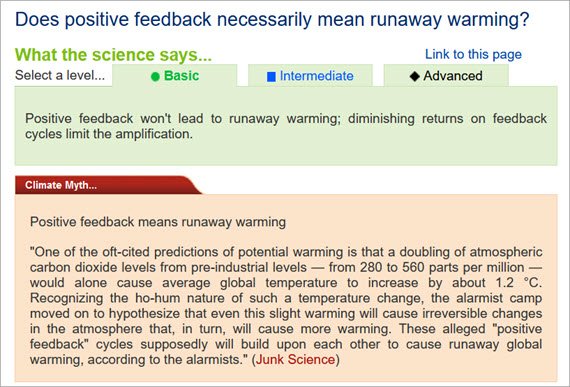At a glance - Does positive feedback necessarily mean runaway warming?
Posted on 11 June 2024 by John Mason, BaerbelW, Ken Rice
On February 14, 2023 we announced our Rebuttal Update Project. This included an ask for feedback about the added "At a glance" section in the updated basic rebuttal versions. This weekly blog post series highlights this new section of one of the updated basic rebuttal versions and serves as a "bump" for our ask. This week features "Does positive feedback necessarily mean runaway warming?". More will follow in the upcoming weeks. Please follow the Further Reading link at the bottom to read the full rebuttal and to join the discussion in the comment thread there.
At a glance
Yet another climate change myth that has not aged well. As of early May 2024, all of the past 12 months had come in at more than 1.5°C above pre-industrial temperatures, so all of the first sentence is now tripe.
However, with regard to the rest of the myth, the evidence suggests it is extremely unlikely that Earth can enter a runaway greenhouse state.
Why is that? We have two good lines of evidence to support the contention. Firstly, we know an awful lot these days about the geography and climate of Earth in the past. Ancient geography can be determined by examining rock sequences on the continents and noting similarities in their fossil faunas, sedimentary environments and ancient magnetism.
So we know, for example, that around 55.8 million years ago, Ellesmere Island, off the NW coast of Greenland, was a lot warmer than it is today. The main geographical difference between then and now was that the Atlantic Ocean was narrower. The faunal difference was a lot more impressive. Where there are now glaciers and polar bears, back then tortoises, snakes and alligators thrived. Their fossils, along with those of redwood, ginkgo, elm and walnut, are to be found in Ellesmere Island's sedimentary rocks.
The time in question is known as the Palaeocene-Eocene Thermal Maximum. As the name suggests, it was probably the hottest climate experienced on Earth in the past 600 million years. To get temperate to subtropical temperatures in the Arctic is indeed impressive. But there was no runaway beyond that. Why?
Trapping of heat by CO2 and other greenhouse gases causes an energy imbalance on Earth. This imbalance gets amplified by positive feedbacks. A positive feedback happens when the planetary response to a change serves to amplify that change. For example, due to burning of fossil fuels, atmospheric CO2 has gone up by 50%. The resulting enhanced greenhouse effect is heating up the planet. The heating, among other things, melts arctic permafrost, releasing the CO2 and methane trapped within it. These gases amplify that initial change. The effect reinforces the cause, which will in turn further increase the effect, which in turn will reinforce the cause… and on and on.
So won't this spin out of control? The answer is almost certainly not. Feedbacks are not just positive. One very important one is that a warmer planet radiates more energy out to space than a cooler one. This feedback is not only negative but it is also strong.
Furthermore, positive feedback cycles will go on and on, but there will be a diminishing of returns, so that after a number of cycles the effects become insignificant. Thus, if we double the atmospheric concentration of CO2, the amount by which the response to that change - heating - can be amplified is approximately three times.
The creator and spreader of this particular myth is essentially putting words in people's mouths. No surprise there. But we do not need a runaway greenhouse effect to make life on Earth difficult. Just a few degrees of additional heating will do exactly that.
Please use this form to provide feedback about this new "At a glance" section. Read a more technical version below or dig deeper via the tabs above!
Click for Further details
In case you'd like to explore more of our recently updated rebuttals, here are the links to all of them:
If you think that projects like these rebuttal updates are a good idea, please visit our support page to contribute!































 Arguments
Arguments































Comments